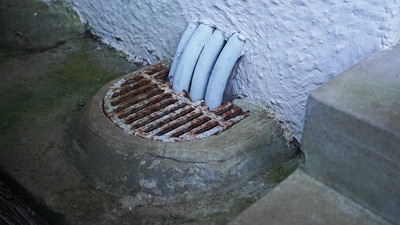With multiple floods occurring every 100th year this year, things aren’t getting any easier for our water infrastructure in many parts of the country.
Excessive rain means too much rainwater, and if this enters the sewage system, it can wreak havoc on local residents.
This is because when stormwater systems overflow, excess water can enter the sewer system and, if there is sufficient volume, lead to a sewage overflow.
Wastewater is water discharged from households and businesses, carrying not only human waste but also residues from products such as soap or detergent. Unlike rainwater, it needs to be treated.
Because when untreated wastewater flows outside the sewer system, it can impact not only the health of the people who come into contact with it, but also our aquatic ecosystems.
What can you do to make sure you’re not contributing to the overflow?
Wastewater and stormwater leave your home in different ways because they are designed to go to different places – rainwater through a downspout and sewage through a siphon.
You may have never heard of a gully siphon but don’t want to be without one. Gully siphons are basins in the ground that collect wastewater before it enters the sewer. Your toilet has its own drain, but the remaining water from the sink, shower and washing machine goes into the siphon.
They feature a water seal to keep nasty sewer odors out of your home and are usually located outside on a wall connected to your kitchen, bathroom or laundry.
Gully siphons should be raised off the ground to prevent ingress of groundwater and covered with a grate so that they do not become clogged with debris.
It’s a good idea to check your siphon regularly to make sure it’s not clogged. If you look under the grate, it should be free of dirt or leaves. A plumber can install a drain plug if needed and easily clear a clogged pipe.

Downspouts direct rainwater directly from your roof into the rainwater network. It is important that these only connect to the stormwater network and that no rainwater enters the siphon or onto your lawn or driveway. A downspout leading to a gully plug will channel a lot of rainwater into the sewage system and can cause it to overflow.
If your downspout isn’t up to standard, talk to a plumber about the move. Depending on where it is located, that could mean less groundwater for you and less impact on those living downstream.
As you try to reduce the load on your drain, watch out for solid waste and oils. Nothing solid should go down your drain—that means keeping as much food waste out of your kitchen sink as possible. Also, make sure any tissues or paper towels go down the trash can or chimney. Toilet paper is designed to break down in water, so it can be easily flushed down most toilets. And keep toiletries away from your toilet.
While it may not be a solid at room temperature, greases and oils should still be kept out of your pipes. Fats can coagulate into what is known as a “fatberg,” a solid structure of fat mixed with other non-biodegradable matter that has found its way down the drain. These limit the amount of water that can flow through the pipe, making it more likely to overflow.
So what can you do with leftover cooking oil? It is best to put it in a sealed container after it has cooled and then throw it in the bin. It might not be the most luxurious thing, but leaving a container of oil on your workbench until it’s full – rather than throwing out each batch of oil individually – is a great way to reduce waste.
If you’re thinking of buying a home, consider inspecting the plumbing as part of your due diligence. Older homes can experience plumbing leaks, tree roots growing through pipes, or clogs that have formed over the years and may recur in the future. The repair can be expensive. So find out what to expect before you move in and avoid the surprises of a blocked drain.
Climate change is causing our weather patterns to change too, and this year Aotearoa has already had more than enough rain. What is being done to help our infrastructure deal with the flood?
Water supply reforms are to be introduced by 2026. That means changing the way water infrastructure is managed, but that may not mean upgrading your local sewage or stormwater system.
So be careful what you put down your drains and make sure they go to the right place. This is a change you can make now to ensure your plumbing doesn’t become a problem for your neighbors.
www.1news.co.nz
https://www.1news.co.nz/2023/06/12/plumbing-tips-to-prevent-an-overflow-of-wastewater/















